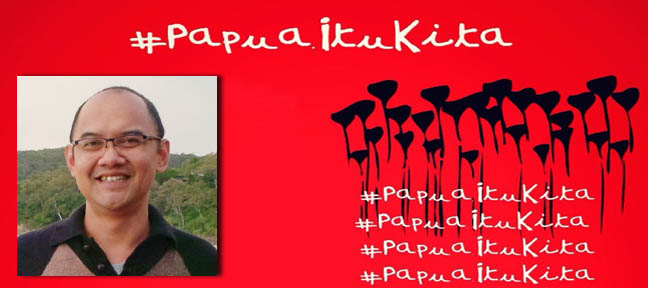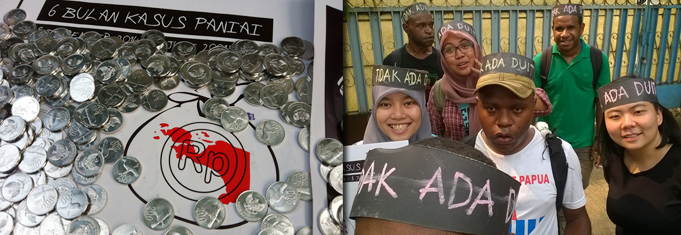
Article in PDF (Download)
#papuaitukita as a civic passion for Papua Dr Budi Hernawan, Research Fellow at the Institute for Policy Research and Advocacy (ELSAM), Jakarta, Indonesia
Prompted by the killings of four high school children in the highlands of Paniai in Papua, Indonesia, a group of activists, academics (including the author) and concerned citizens initiated a civic movement called #papuaitukita. Relied on the effectiveness of social media in drawing the Indonesian public attention, this movement aims at breaking the silence and the ignorance of the Indonesian national public of the continuing state-sponsored violence of Papua. This is the passion that inspires this movement.
What did happen in Paniai? Perhaps many of us might not be aware of that despite the growing Indonesia’s democracy, state killings continue in Papua. The killing occurred on the eve of the visit of Indonesian President Joko Widodo to Papua after Christmas 2014. Pius Youw, Yulian Yeimo, Apinus Oktopia Gobay and Simon Degei were shot dead by the Indonesian state apparatus without any reasons while they were preparing Christmas in their village. These children were innocent.
Various national and international human rights groups have raised their voices to the Indonesian National Commission on Human Rights (Komnas HAM), the Indonesian Witness Protection Agency (LPSK) and President of Indonesia calling for immediate actions. Specifically the Paniai Customary Council (Dewan Adat Paniai) demanded the establishment of the Inquiry Commission by Komnas HAM equipped with sub-poena power to investigate the case as authorised by Law No. 26/2000 on Human Rights Court.
This demand was informed by the facts that many cases of human rights violations committed by the Indonesian state apparatus have never brought to justice. Partially adapted from the 1998 Rome Statue, Law No. 26/2000 is the only legal provision within Indonesian legal system that authorises Komnas HAM to undertake pro-justitia investigation in order to find sufficient evidence to prosecute perpetrators through a special court, namely the Indonesian Human Rights Court. Since its enactment, only one case has ever been brought to court, namely the 2000 Abepura case.
This was the case of torture and extra-judicial killing in Jayapura committed by the Indonesian police. Komnas HAM recommended two police commanders who were in charge of the raid against civilians to be held responsible under the principle of command responsibility. Following the logic of ordinary criminal prosecution, the judges, however, ruled that the police commanders were not directly involved in the crimes and thus were found not guilty. They were released free and later were promoted. This was a shocking decision for victims given the amounting evidence presented by prosecutors and testimonies from the victims and witnesses. Learning from this experience the Paniai Customary Council is committed to prevent that such thing will happen again to the Paniai case.
Despite continuous pressure of the civil society, it took months before Komnas HAM made a decision to establish the Inquiry Commission or the Ad Hoc Team. Even then, Papua activists questioned (Tabloid Jubi, 1/7/2015) the commitment of Komnas HAM as this state-funded institution acknowledged that they has no funds to conduct pro-justitia investigation into the case. In comparison to the previous Komnas HAM pro-justitia investigation into some cases in Papua such as Abepura, Wasior and Wamena, the current Komnas HAM team seems indecisive and hesitant in taking any steps closer to investigation. As a result, once again early July 2015, #papuaitukita mobilised public support to put pressure on Komnas HAM to be true on its words. They collected coins and brought them to Komnas HAM office as a symbol of donation to support the work of Komnas HAM.
Public awareness is the unchartered area in the Indonesian psyche. With some 250 million population and spread across 14,000 islands, Indonesia is a massive geographical and political landscape to cover. Layers of memory of violence in the last decades remain buried in victims’ mind from the history of the martial law in Aceh to then East Timor to Papua, from the massacre of half-million of the so-called communist suspects in 1965-1966 across Indonesia, from ethnic violence in Kalimantan to religious-based violence in Maluku to acts of terrorism in Java, Bali, Sulawesi and Nusa Tenggara. This mosaic of violence still begs for explanation and recognition from the public and the state narrative.
This is the context of the movement of #papuaitukita. It is part of large, vibrant and resilient Indonesian civic movement who promotes civic values, human rights, pluralism, and humanity. The movement has toppled down the authoritarian regime of Soeharto’s New Order. It opposed the rise of fundamentalism in Indonesia. It managed to secure a fair presidential election during the last presidential election. It responds to Rohingya refugees but also combats violence against minor, such as the case of Engeline in Bali. In other words #papuaitukita is not unique as a civic movement. Rather it is an organic element of the expansion of civic passions of the Indonesian community who does not tolerate any trends, actions, policies that do not respect humanitarian principles, human rights standards, and the rule of law.
#papuaitukita, however, is not only active in the area of legal and human rights. The movement actively engages the Indonesian national public through performing arts. In June 2015, we organised a cultural event involving young musicians, Papuan Church leaders, and activists in order to speak about Papua to the national public with a universal language: arts. Located at Taman Ismail Marzuki, the heart of Jakarta arts centre, #papuaitukita built the bridge between the national public and Papua. The arts perhaps is an effective language as the movement has to confront stigmatisation of the state over those who support the Papuan struggle for recognition and identity. They can be easily labeled supporters of separatists or secessionists and thus can be classified as inciting treasons.
Anyhow, this is just the beginning of the movement. Although it is hopeful, it is also fragile and requires supports from all of us to grow this civic passion for Papua.
© Dr Budi Hernawan
All images are courtesy of #papuaitukita



